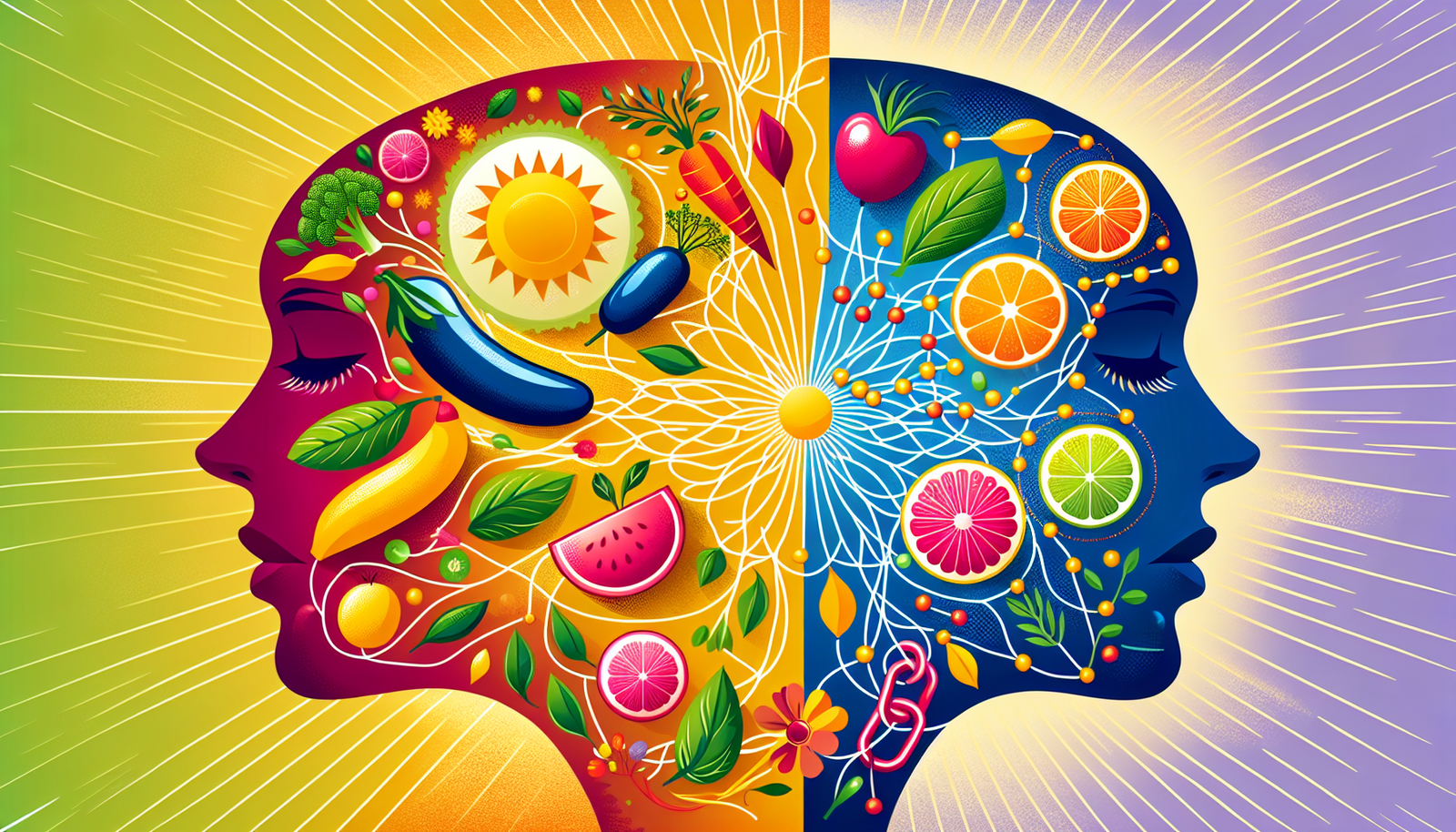Understanding the Connection Between Diet and Mood Support
Understanding the Connection Between Diet and Mood Support
The Mind-Gut Connection
The relationship between diet and mood is increasingly gaining attention, especially in light of research highlighting the mind-gut connection. The gut microbiome—comprising trillions of microorganisms—plays a crucial role in regulating mood and mental health via several mechanisms. These microorganisms are responsible for producing neurotransmitters such as serotonin and dopamine, which are intricately linked to mood regulation. Approximately 90% of serotonin is produced in the gastrointestinal tract, underscoring the importance of a balanced diet for maintaining mental well-being.
Nutrients that Affect Mood
A variety of vitamins and minerals significantly influence brain function and mood. Some of these key nutrients include:
-
Omega-3 Fatty Acids: Found in oily fish (like salmon and sardines), chia seeds, and walnuts, omega-3 fatty acids are essential for neural function. Studies suggest that higher intake of omega-3s may reduce symptoms of depression and anxiety by modulating inflammation and neurotransmitter pathways.
-
B Vitamins: B vitamins, particularly B6, B12, and folate, are vital for cognitive function and mood regulation. Deficiencies in these vitamins have been linked to increased risk of depression. Foods rich in B vitamins include leafy greens, legumes, eggs, meat, and dairy products.
-
Vitamin D: Often referred to as the "sunshine vitamin," vitamin D is synthesized when the skin is exposed to sunlight. It is critical for brain health, and low vitamin D levels have been associated with mood disorders. Sources of vitamin D include fortified foods, fatty fish, and egg yolks.
- Magnesium: This mineral plays a role in numerous biochemical reactions in the body, including those involved in mood regulation. Foods high in magnesium—such as nuts, seeds, whole grains, and dark leafy greens—can help alleviate symptoms of depression and anxiety.
The Role of the Gut Microbiome
The composition of the gut microbiome has a profound impact on mental health. A diverse microbiome is generally associated with better mental health outcomes. Fermented foods, which are high in probiotics, such as yogurt, kefir, kimchi, and sauerkraut, can help promote a healthy gut microbiome.
Prebiotics, found in foods like garlic, onions, and bananas, serve as food for beneficial gut bacteria. A balanced intake of prebiotics and probiotics can help foster a healthier gut, which in turn may improve mood and cognitive function.
The Impact of Processed Foods and Sugar
Consumption of highly processed foods and sugars can have negative effects on mood. These foods often lead to drastic fluctuations in blood sugar levels, which can result in mood swings, irritability, and fatigue. A diet high in refined sugars has also been linked with an increased risk of depressive symptoms.
Conversely, a diet focused on whole foods—fruits, vegetables, whole grains, and lean proteins—can stabilize blood sugar and provide steady energy, promoting a more stable mood. The anti-inflammatory properties of whole foods further support overall mental health, as chronic inflammation is often associated with mood disorders.
The Importance of Hydration
Staying hydrated is crucial for physical and mental well-being. Dehydration can lead to fatigue, confusion, and irritability. Water is essential for nutrient absorption and circulation, and even mild dehydration can impair cognitive function.
Incorporating hydrating foods—such as cucumber, watermelon, and citrus fruits—alongside regular fluid intake can help maintain hydration levels, thereby supporting mood and cognitive function.
The Effect of Caffeine and Alcohol
Caffeine can provide a short-term boost in mood and energy; however, excessive consumption may lead to anxiety and sleep disturbances. It is essential to balance caffeine intake and monitor individual tolerance levels.
Alcohol, on the other hand, is a depressant. Although it may initially create feelings of euphoria, alcohol is associated with long-term mood destabilization and increased risk of depression. Reducing alcohol consumption can lead to improved mood and mental clarity.
Meal Timing and Regularity
Meal timing and regularity also play a significant role in mood regulation. Eating regular, balanced meals helps maintain stable blood sugar levels. Individuals who skip meals or follow erratic eating patterns may experience irritability and mood swings due to fluctuations in blood sugar.
Establishing a consistent meal schedule can promote balanced energy levels and contribute to emotional well-being.
Lifestyle Factors that Influence Mood and Diet
Several lifestyle factors can significantly intersect with diet and mood. Regular physical activity has been widely researched for its positive effects on mental health. Exercise increases the release of endorphins and other mood-enhancing chemicals in the brain, promoting an overall uplifted mood.
Sleep is another crucial factor. Poor sleep quality or insufficient sleep can lead to irritability and exacerbate symptoms of anxiety and depression. A consistent sleep schedule helps support mental health and can be positively influenced by dietary choices.
Mindful Eating Practices
Mindful eating practices can greatly enhance emotional well-being. Taking time to savor food, paying attention to hunger cues, and engaging all senses while eating can lead to better food choices and improved mood. Mindful eating reduces the likelihood of emotional or stress-related eating, which often involves unhealthy food choices.
The Role of Therapy and Support
While diet is a critical component of mood support, it is essential to acknowledge that mental health struggles often require comprehensive approaches, including therapy and social support. Cognitive-behavioral therapy (CBT) and other therapeutic modalities can empower individuals to develop healthier coping mechanisms and attitudes towards food and mood.
Support groups or community programs can provide emotional backing and foster a sense of belonging, potentially reducing feelings of isolation.
Strategies for Implementing Mood-Supportive Diet Changes
-
Incorporate Whole Foods: Start by gradually adding more fruits, vegetables, whole grains, and lean proteins into your diet. Focus on variety to capture diverse nutrients essential for brain health.
-
Experiment with Meal Prep: Planning meals ahead of time can help eliminate the stress of last-minute decisions and ensure you have mood-supportive options readily available.
-
Limit Sugar and Processed Foods: Aim to reduce refined sugars and processed foods, gradually replacing them with healthier alternatives to maintain steady energy levels.
-
Stay Hydrated: Prioritize water intake throughout the day. Consider setting reminders or carrying a reusable water bottle.
-
Practice Mindful Eating: Dedicate time to enjoy meals without distractions. Engaging fully with the eating experience can enhance satisfaction and prevent overeating.
-
Seek Professional Guidance: Consult a registered dietitian or nutritionist for personalized advice and to develop a diet plan that aligns with your mood support goals.
-
Regular Exercise: Aim for at least 150 minutes of moderate exercise per week to enhance the benefits of dietary changes on mood.
- Monitor the Impact: Keep a food and mood journal to explore how different foods affect your emotions and energy levels. This reflection can help identify patterns and guide future choices.
The Interconnectedness of Diet and Mental Health
Understanding the link between dietary habits and mood can lead to positive changes in lifestyle that support emotional health. By focusing on nutrient-rich foods, maintaining consistent meal patterns, engaging in mindful practices, and integrating physical activity, individuals can forge a pathway to enhanced emotional stability.
This holistic approach can serve as a valuable tool in the journey toward a healthier and more balanced life for those seeking to improve their mood through dietary choices.








